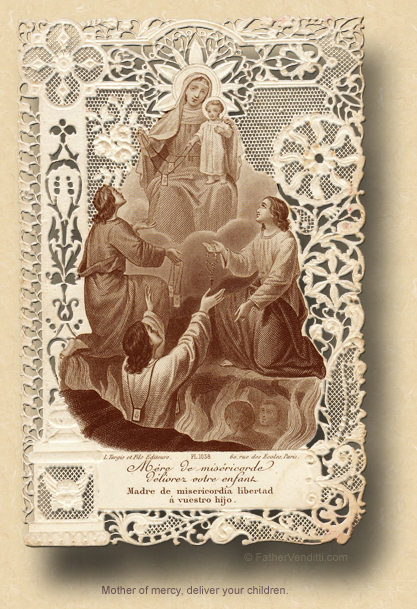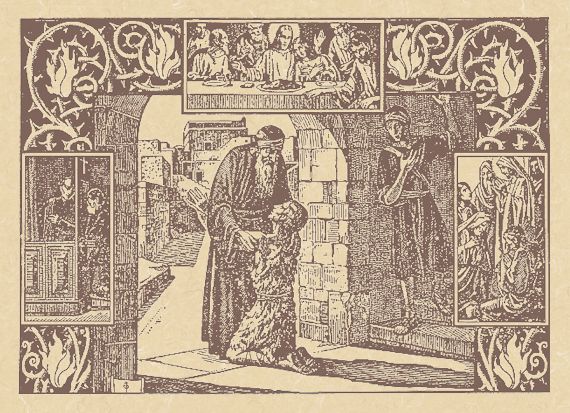True Forgiveness vs. Emotional Blackmail.
The Third Saturday of Lent; and, the Commemoration of Saint Cyril of Jerusalem, Bishop & Doctor of the Church.*
Lessons from the feria, according to the ordinary form of the Roman Rite:
• Micah 7: 14-15, 18-20.
• Psalm 103: 1-4, 9-12.
• Luke 15: 1-3, 11-32.
The Third Saturday of Lent; and, the Commemoration of Saint Cyril of Jerusalem, Bishop, Confessor & Doctor of the Church.*
Lessons from the feria, according to the extraordinary form of the Roman Rite:
• Genesis 27: 6-40.
• Psalm 91: 2-3.
• Luke 15: 11-32.
The Third Saturday of the Great Fast; the Third All Souls Saturday; and, the Feast of Our Holy Father Cyril, Archbishop of Jerusalem.**
First & third lessons from the pentecostarion, second & fourth from the menaion of the dead, according to the Ruthenian recension of the Byzantine Rite:
• Hebrews 10: 32-38.
• I Thessalonians 4: 13-17.
• Mark 2: 14-17.
• John 5: 24-30.
FatherVenditti.com
|
 8:35 AM 3/18/2017 — Today our Lord presents to us a story about forgiveness which is so familiar to us that we automatically assume we know what it means: the prodigal son returns and his father forgives him, illustrating the comforting fact God is ready to forgive us no matter how far we stray. That's a good third grade explanation of the parable, but it isn't sufficient because there are more than two characters in this story: there's a son who goes astray and a father who forgives him; but, there's also another son, and he's the one who's important. 8:35 AM 3/18/2017 — Today our Lord presents to us a story about forgiveness which is so familiar to us that we automatically assume we know what it means: the prodigal son returns and his father forgives him, illustrating the comforting fact God is ready to forgive us no matter how far we stray. That's a good third grade explanation of the parable, but it isn't sufficient because there are more than two characters in this story: there's a son who goes astray and a father who forgives him; but, there's also another son, and he's the one who's important.
We always overlook the older son in this story. We always focus on the younger son, the prodigal son; that’s why we call it “the Parable of the Prodigal Son.” But the older son is important, too. He goes to his father and makes two accusations: he accuses his brother of wasting his inheritance on loose women;—an accusation for which there is no evidence, since the Gospel only says he ran out of money but doesn't say why—but, he also accuses his father of being unfair, and this accusation is true. In doing what he does for the prodigal son, the father has done a gross injustice to his elder son.
And isn't the reaction of the older son exactly how we react to God when we think he's been unfair to us? We lose a loved one to death, for example—a child or a spouse or a parent—and we don't care that God has taken that person to himself; we only care what we think he's done to us. Or we or someone we love is forced to suffer a long or painful illness. We don't care that he's given that person a great opportunity to avoid Purgatory by allowing them to sacrifice here on earth; we only want him to be nice to us now.
We, of course, don't fault the father for his forgiveness because we know he represents God, and we like the idea of God always willing to forgive us no matter how wretched we've behaved; but, his manner of forgiveness is not typical, and highlights the fact that we often don't look at what he does in this parable closely enough, because the way the father chooses to forgive his younger son is actually very foreign to us. He doesn't scold him, nor does he offer his forgiveness conditionally, demanding an apology the way we usually do. We make ourselves feel better, pretending to be magnanimous by saying, “I forgive you,” but we always make sure to collect our pound of flesh in the process. Our forgiveness is really nothing more than a kind of emotional blackmail: “I forgive you, so long as you continue to feel guilty about it.” And you have to admit that, nine times out of ten, that's how we “forgive” anyone whom we feel has done us wrong. But the father in the parable doesn't do any of that; instead, he interrupts his son's apology and throws a party, pretending that the offense never took place, which only highlights the difference between the kind of forgiveness we so often offer to each other and the nature of God's forgiveness to us when we've sinned.
As a society, we've become obsessed with the whole concept of fairness, and as Americans we've been conditioned to frown upon any hint of injustice; and, this kind of thinking infects our relationship with God. The use of this familiar parable as the Gospel lesson of today's Mass gives us an opportunity to reflect on the fact that God doesn't deal with any of us according to the rules of human justice. God owes us nothing. And even if we live a perfect life of perfect virtue, God owes us nothing. Living the way God wants us to live is what we owe to God; and, to quote a line I've used many times before, salvation—which is the only goal of the Christian’s life—is not payment for services rendered.
As this season of Lent continues, let us pause to reflect on what kind of conditions we may have placed on our love and worship of God, and be thankful for the fact that God has placed no such conditions on us, making forgiveness of our sins only a confession away.

* Because Lent began on a Wednesday, today is the third Saturday. Cf. the post here under the heading "Hey, aren't you off by a week?" for an explanation of how the days of the liturgical calendar are rendered on this site as opposed to how they are designated in the Roman Missal.
In the ordinary form during Lent, memorials automatically become commemorations, the observance of which is optional. If observed, only the Collect of the saint is used, with everything else taken from the feria, and the color of the season worn. In the extraordinary form, third class feasts also become commemorations, with the commemoration made by an additional Collect, Secret and Postcommunion added to those of the feria, and the color of the season is worn.
Cyril of Jerusalem (315-386) is known mainly for his lectures to catechumens and the newly baptized. His extent instructions show conclusively that Catholic doctrine is the same now as it was then. He was three times exiled from Jerusalem by the Arian heretics who denied the divinity of Christ. One of his instructions, taken out of context, is sometimes cited as supporting the practice of receiving Holy Communion in the hand, but this was intended for those who were taking Communion to the sick, not for those receiving themselves at Holy Mass.
** Because the Great Fast began on a Monday, today is the third Saturday.
While the Western Church commemorates the Holy Souls once a year on November 2nd, the Churches of the Byzantine Tradition do so five times a year: once during the Triodion, three times during the Lenten season and once during the Paschal season, always on a Saturday; these are called the All Souls Saturdays.
|

